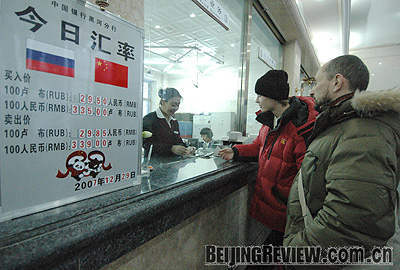|
 |
|
REGIONAL FUNCTION: The renminbi has already been a major currency for cross-border trade settlement in countries adjacent to China such as Russia, Mongolia, Viet Nam and Cambodia (QIU QILONG) |
Five of China's key manufacturing cities will launch services allowing the experimental use of the renminbi for international trade settlements. This move, aimed at reducing risks from exchange rate fluctuations, is a boon for Chinese exporters who already have had their profits squeezed at both ends.
The State Council, China's cabinet, said on April 8 that Shanghai, Guangzhou, Shenzhen, Zhuhai and Dongguan would spearhead the renminbi-settlement program. Except for Shanghai, the eastern seaboard city that intends to become a global financial center and shipping hub by 2020, the other four are located in Guangdong Province, adjacent to Hong Kong, and all have great numbers of export-oriented factories.
So far, some exporters and importers have applauded the decision.
"We will no longer worry about losses from renminbi appreciation, and this is conducive to export volume recovery," said Xu Haifu, General Manager of Beijing Haifu Apparel Trade Co. Ltd.
Xu's company used to be an export-focused apparel manufacturer and relied on dollar settlements for most of its transactions. But because of the renminbi's sharp appreciation against the U.S. dollar since the second half of 2007, it has had to sell more goods to domestic customers to mitigate its losses. Yet, local rivals make the competition even more merciless, Xu said. The upcoming experimental renminbi settlement program has boosted his confidence that the company's export activities will recover, he said.
China wants to help enterprises to expand their cross-border transactions and facilitate the recovery of the listless international trade market because of a weak dollar. The launch of renminbi settlement for cross-border transactions amid the recession is conducive to promoting trade between China and its neighboring countries, shunning risks from exchange rate fluctuations, improving the environment for international trade, and maintaining steady growth in the cross-border trade volume, according to a State Council executive meeting report.
Regional currency
The renminbi has been a currency for regional trade settlement for some time. For example, the People's Bank of China, the central bank, made it clear in December 2004 that the renminbi had been a major currency for cross-border trade between China and Russia, Mongolia, Viet Nam, Cambodia and Nepal.
China's neighbors have increased their demand for the renminbi since the outbreak of the financial crisis. Between late last year and early this year, China signed a handful of currency exchange agreements with neighboring countries and regions.
"Many countries have reduced their U.S. dollar reserves and hence their reliance on the dollar because of the crisis," said Cao Honghui, Director of the International Finance Research Center of the Institute of Finance and Banking under the Chinese Academy of Social Sciences, a major government think tank. "Instead, they began to use other currencies for international payment and settlement, and the renminbi is a nice alternative."
Before the Central Bank decided on the experimental use of renminbi-based settlements, it had signed currency exchange agreements totaling 650 billion yuan ($95 billion) with countries or regions such as South Korea, Hong Kong, Malaysia, Belarus, Indonesia and Argentina. Through these agreements, China has expanded the global use and coverage of the renminbi and provided sufficient capital for future cross-border transaction settlements in the currency, Cao said.
|
